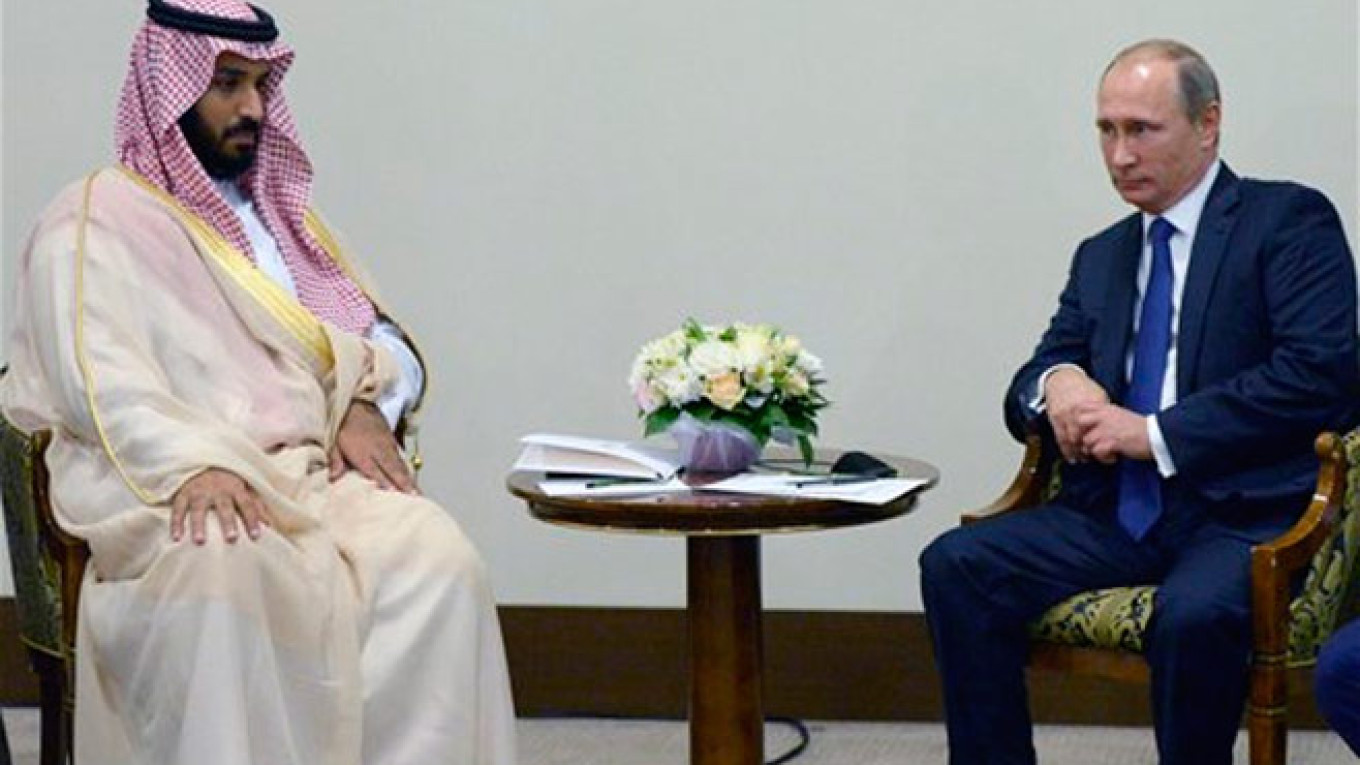President Vladimir Putin met with Saudi Defense Minister Sheikh Mohammed bin Salman in Sochi on Oct. 11, while Russian Foreign Minister Sergei Lavrov was holding a meeting with his counterpart, Saudi Foreign Minister Abdel Al-Jubeir. The parties discussed Syria and agreed upon the necessity to prevent the creation of a terrorist caliphate and to open military talks on the target for Russia's air force operations. However, the fact that top-level Saudi officials made the trip to Sochi reflects Riyadh's deepening concerns about Iran's growing influence in the Middle East.
The Russian air campaign that began in Syria on Sept. 30 has overshadowed the bombings of the Islamic anti-government coalition led by Washington since September 2014, and has weakened the Sunni front, plagued by divergences over Syrian President Bashar Assad's fate. Despite the fact that the Russian and U.S. militaries are discussing how to avoid incidents in Syrian airspace, these talks are very unlikely to lead to the creation of a Russian-American coalition under the aegis of the United Nations.
Russian involvement could even suit the U.S., as they are currently short of initiatives on Syria. In turn, the Arab League has remained silent since the beginning of the Russian strikes. Saudi Arabia and Qatar merely co-signed with the Western countries a statement calling for an end to Russia's operations against the so-called "moderate" opposition. For their part, the United Arab Emirates even welcomed the Russian bombings on the Islamic State and the al-Nusra Front (al-Qaida), while Egypt openly supports Moscow. Turkey, which has embarked on a war against the PKK, is resigned to Assad's presence in a transitional solution.
Outpaced by the Russian initiative and exasperated by Washington's procrastination on the Syrian issue, Saudi Arabia could consider Russia's increasing strategic footprint in the Middle East as a counterweight to Iran's growing influence in the region. Russians and Saudis, whose relationship is historically troubled, will be all the more tempted to find common ground as both are frustrated with Washington's policies in their neighborhood and cast wary eyes to the warming of relations between Iran and the West.
The Russo-Saudi relationship, which is one of the factors in any settlement of the Syrian conflict, has seen improvements over the last month: Saudi petrodollars are financing most of the Egyptian arms contracts signed in recent months, including the $2 to $3 billion of orders from Russia in 2014.
In addition, Saudi petrodollars certainly financed, at least in part, the purchase of the two former Russian Mistral-class ships from Paris in September. After the promise made in July by Saudi Arabia's sovereign wealth fund to inject $10 billion into the Russian economy, we learned in late September that Riyadh had ordered nearly 950 BMP-3 infantry fighting vehicles from Russia.
Moscow, for its part, has taken a step toward Riyadh, hinting in recent weeks that it would be possible to discuss oil production with OPEC. This is a strong signal: Until now, the Kremlin had categorically refused to discuss the subject with this organization.
The levers of a hypothetical Russian-Saudi deal are well-known: a rise in oil prices, possibly accompanied by Saudi arms purchases, and on the Russian side, the guarantee that Assad will leave after a transition period, along with some kind of a Saudi "right of scrutiny" on Russian arms sales to Iran. There is little time left for Riyadh: Its intervention in Yemen has been getting bogged down since last March and might turn into a fiasco, while Russian-Shia and Kurdish operations in Syria could shortly reverse the balance of power in favor of the Syrian regime, further consolidating the Iranian footprint in the Levant.
The scheduled meeting of the Russian-Saudi Intergovernmental Commission later this month could provide the necessary framework for Riyadh and Moscow to discuss arrangements for a greater convergence on Syria. Both sides have stated that energy and military-technical issues will have a prominent place on the agenda of the meeting.
Igor Delano?‘ is deputy director of the Franco-Russian analytical center Observatoire.
A Message from The Moscow Times:
Dear readers,
We are facing unprecedented challenges. Russia's Prosecutor General's Office has designated The Moscow Times as an "undesirable" organization, criminalizing our work and putting our staff at risk of prosecution. This follows our earlier unjust labeling as a "foreign agent."
These actions are direct attempts to silence independent journalism in Russia. The authorities claim our work "discredits the decisions of the Russian leadership." We see things differently: we strive to provide accurate, unbiased reporting on Russia.
We, the journalists of The Moscow Times, refuse to be silenced. But to continue our work, we need your help.
Your support, no matter how small, makes a world of difference. If you can, please support us monthly starting from just $2. It's quick to set up, and every contribution makes a significant impact.
By supporting The Moscow Times, you're defending open, independent journalism in the face of repression. Thank you for standing with us.
Remind me later.


